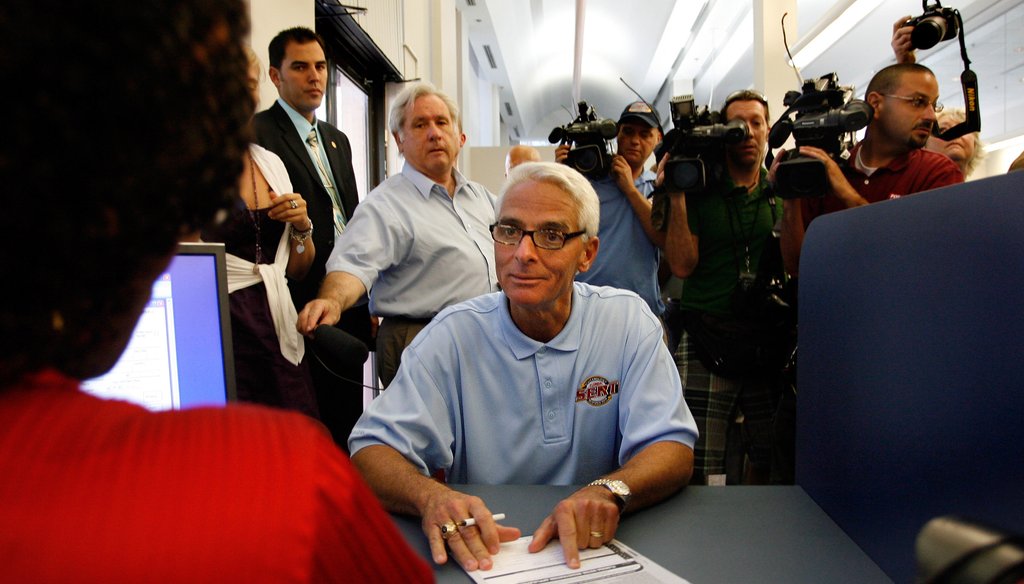Stand up for the facts!
Our only agenda is to publish the truth so you can be an informed participant in democracy.
We need your help.
I would like to contribute

Gov. Charlie Crist said he was running as a Republican. Until he wasn't.
Gov. Charlie Crist said he would run for the U.S. Senate only as a Republican.
Until he changed his mind.
He said he probably would return political contributions from GOP donors who asked for their money back. Then, with a wink, he said he wouldn't.
Marco Rubio, Crist’s U.S. Senate rival, has been accused of shifting his position on cap and trade, the federal stimulus bill and Arizona's immigration law.
Attorney General Bill McCollum, a candidate for governor, was so unhappy with the Arizona law that he described it as "far-out." But then he endorsed a revised version and said he would support a similar law in Florida. Three days later, he said Florida didn't need the law at all.
Topsy-turvy politics are defining the 2010 campaign, forcing Florida candidates to make some quick adjustments at the line of scrimmage -- and sometimes big shifts on key issues.
Political flip-flops aren't new -- New York Times columnist William Safire dates the term back to the late 19th Century, when a politician was once labeled "the Florida flopper" by an opponent.
But the flips have been coming fast and furious in Florida because of an unusual combination of factors that includes Crist’s hasty exit from the GOP race, the rise of the tea party movement and Rubio, the Gulf oil spill and Arizona’s controversial immigration bill.
Since PolitiFact Florida launched in March, we've rated six items on our Flip-O-Meter, which measures how much candidates and elected officials change their positions. In all six cases we found a Half Flip or a Full Flop.
Republicans and Crist have borne the brunt of the flip-flop accusations because of the contested primary for governor, along with the Rubio-Crist clash.
Take Crist, for example.
As rumors began to surface that he would bolt an increasingly difficult GOP primary with Rubio, Florida's governor tried to stamp out any indie-party chatter during a debate on FOX News and then in an unequivocal press release. Campaign manager Eric Eikenberg dismissed the "rumor" this way: "This should completely and utterly put to rest any of the unfounded rumors coming from the Rubio campaign that Governor Crist would run as anything other than the Republican that he is."
When Crist officially switched his party affiliation at a St. Petersburg elections office May 12, Rubio's campaign called it the "flip-flop heard 'round the country." Added state Sen. Mike Haridopolos, "He's making John Kerry look like the rock of Gibraltar."
Trouble landing on your feet
Sometimes, a politician's change in position can be seen as a positive trait, a willingness to compromise. But particularly in campaigns, a flip-flop is viewed as a pejorative -- a sign that a candidate is more concerned with political winds than principle. Get tagged with the label and the results can be devastating.
Kerry's flip on voting for Iraq war funding -- "I actually did vote for the $87 billion before I voted against it" -- gave President George W. Bush a potent line of attack that undercut Kerry's credibility and contributed to his 2004 loss. In Florida, analysts often say Gov. Bob Martinez's flip-flop on a services tax was a key reason why he lost in 1990.
The tax on services in 1987 was proposed as a way to raise $1 billion to help balance the state budget. But the tax was so unpopular, Martinez led the fight for its repeal eight months later.
Martinez tried to repair the damage. "You've told me I've disappointed you sometimes," the Republican said in a campaign ad. "I've listened, and I've learned."
But he never recovered, losing to Lawton Chiles by 13 percentage points.
It’s too early to say if any of the 2010 flip-flops have the potential to be as damaging. Will it ultimately matter that Crist left the Republican Party to run as an independent? Maybe not, since it looked like Rubio was going to clobber him in the August primary, while polls show him leading a three-way race for the November election.
But it won't stop the campaigns from trying. Crist is airing a Web advertisement saying Rubio has waffled in his support for high-speed rail in central Florida. And a central theme of Rubio's campaign is that you cannot trust Crist.
The Rubio campaign last week highlighted Crist's most recent flip. He said last Monday that he didn't want to repeal Don't Ask Don't Tell. But by Thursday, he was "inclined" to support a measure in the U.S. Senate that would do exactly that.
"Charlie Crist’s win-at-all-costs attitude has turned him into the political version of Forrest Gump’s box of chocolates: Floridians never know what they’re going to get," Rubio spokesman Alex Burgos said. "It’s clear Charlie Crist will say anything, do everything and change any position to win an election."
Immigration issues
For some Florida Republicans, dealing with Arizona's immigration law has proven particularly troublesome.
While some GOP officials have offered tentative support after concluding that the hard-line law is popular with the Republican base, others such as U.S. Rep. Connie Mack have taken a strong stand against it.
The issue is a tricky one because Republican leaders want to appeal to their conservative base, which largely supports the law, but also broaden their appeal to Hispanic voters, who largely oppose it.
The tightrope-walking act is perhaps no more apparent than with Rubio and McCollum, the Republicans running for the U.S. Senate and governor.
Rubio, who is becoming a national conservative figure, said the law -- which essentially requires immigrants to prove their resident status if stopped by police -- could create a "police state" when speaking to a crowd in South Florida. But later, in talking to the conservative website, Human Events, he said he would have voted for the Arizona law had he been in the Legislature.
McCollum, meanwhile, first said the law was far out, then said he would support an Arizona-style law in Florida, then said Florida doesn't need the Arizona law.
Both Rubio and McCollum explain their differing comments by noting that the Arizona law was ultimately amended in an attempt to exclude the possibility of racial profiling.
But that only accounts for part of their statements.
Rubio's "police state" comment was in reference to immigrants being required to present documents confirming their legal resident status at a moment's notice. That provision was never removed from the law.
And McCollum's comments that he would support an Arizona-style law in Florida but that the state doesn't need one both came after the final version was passed and signed into law.
A liberal South Florida blogger declared McCollum's shifting position a "rare triple-backflip on immigration." PolitiFact Florida gave Rubio a Half Flip and McCollum a Full Flop.
Oil slick shifts
The oil platform explosion and subsequent leak in the Gulf of Mexico also has tested the ideology of politicians.
Crist grew up opposing offshore oil drilling, even telling stories of cleaning oil off birds during a Tampa Bay area oil spill. But in 2008, with gasoline prices hovering near $4 a gallon and Crist being mentioned as a possible vice presidential candidate for a ticket that would popularize the phrase "drill, baby, drill!," Crist backed off his previous unflinching opposition.
"I think an open-minded person understands that we ought to at least study (offshore drilling)," he said then.
Contrast that with today — where we find Crist leading the opposition to offshore drilling, and pondering an amendment to the state Constitution that would ban drilling in state waters.
Two key legislative Republicans — incoming Speaker Dean Cannon and Haridopolos, the incoming Senate president — also went from strong proponents of drilling to road blocks to any proposal.
Haridopolos explained the flip this way: "This," meaning the spill, "is a game changer."
Not always bad
Although flip-flopping generally makes you a target of scorn in politics these days, it's important to put it in perspective. Former Gov. LeRoy Collins was a famous Florida flip-flopper, too.
But in his case, it cemented his legacy as one of the state's greatest governors.
Collins, who led the state from 1955-1961, initially condemned the landmark U.S. Supreme Court ruling in Brown vs. Board of Education, which forced the integration of public schools.
But he later became a voice for desegregation, clashing with the Florida Legislature and parts of his own political party.
The switch probably cost him the 1968 U.S. Senate election -- where supporters of his Republican opponent Edward Gurney distributed photos of Collins walking with the Rev. Martin Luther King Jr. at a march in Selma, Ala.
"Collins' shift hurt him politically in Florida but led to his being remembered as a great public servant who put what was right ahead of what was politically expedient," said Charles Barrilleaux, LeRoy Collins Professor at the Department of Political Science at Florida State University.
And flip-flops can help: Alabama Gov. George Wallace, a strident segregationist, switched his views in the late 1970s, apologized to black voters and was elected governor in the 1980s as a result.
"His flip-flop resurrected his political career," Barrilleaux said.
Wonder if that's a script Crist has read?
Aaron Sharockman can be reached at (727) 892-2273 or [email protected].
Our Sources
See individual item for sources.




























